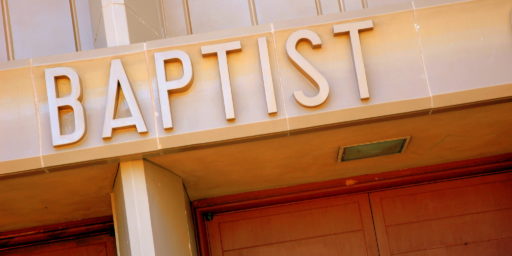Baptist Colleges Cutting Church Ties
Feeling the conflict between their church and their educational mission, many Baptist colleges are pulling out from under church control. Smaller institutions like Kentucky’s Georgetown College and Tennessee’s Belmont and Georgia’s Mercer are following the trend started by more prominent schools like Wake Forest and Furman.
The issues vary from state to state. But many Southern Baptist colleges and their state conventions have been battling over money, control of boards of trustees, whether the Bible must be interpreted literally, how evolution is taught, the propriety of some books for college courses and of some plays for campus performances and whether cultural and religious diversity should be encouraged. At the root of the conflicts is the question of how much the colleges should reflect the views of their denomination. They are part of the continuing battle among Southern Baptists for control of their church’s institutions.
[…]
Southern Baptist colleges are affiliated with the state conventions, and it does not make sense to many members of the conventions to provide significant annual subsidies to Baptist colleges that they view as out of tune with conservative positions on central religious tenets, including how to interpret the Bible. “I did feel that Georgetown was not on the same page as most Kentucky Baptists,” said Dr. York, who was president of the Kentucky Baptist Convention last year.
But efforts to rein in what many Southern Baptists see as inappropriate departures from religious orthodoxy have looked to many professors and college administrators like efforts to limit academic freedom. “The convention itself in its national and state organizations has moved so far to the right that previous diversity on the faculty and among the trustees is no longer possible,” said Bill Leonard, dean of the Divinity School at Wake Forest. “More theological control of the curriculum and the faculty has been the result.”
David W. Key, director of Baptist Studies at the Candler School of Theology at Emory, put it more starkly. “The real underlying issue is that fundamentalism in the Southern Baptist form is incompatible with higher education,” Professor Key said. “In fundamentalism, you have all the truths. In education, you’re searching for truths.”
That’s the central question, all right. Religion, even the conservative version of Southern Baptist theology, is not incompatible with education. And the Catholic church has long managed to reconcile theology and open inquiry in its many institutions of higher learning. The way to do that, however, is to recruit qualified academics who are also adherents to a church’s tenets rather than having clergy trying to impose their thinking on universities.






I think you’d be hard pressed to find many Catholic universities where the number of Catholic faculty outnumbered the non-Catholic. With a few notable exceptions (like the Catholic University of America, in DC), religious affiliation doesn’t seem to be a prerequisite for employment.
Catholic colleges and universities, particularly those run by the Jesuits, embrace rational inquiry and are confident that their students, if they truly learn to think for themselves, will arrive at the same conclusions the great Catholic thinkers have before them.
They can do this because Catholicism is the one true faith. Hence they are not afraid of doubt, scepticism, nihilism, or anything the Protestants can throw at them.
Ken slightly exaggerates the RCC’s tolerance for dissent, but it’s true they haven’t the gross insecurity of the Southern Baptists.
One day I will work up an essay on the role of faith in fundamentalist v. mainstream Protestant & RCC denominations. The Baptists’ emphasis on faith, by exaggerating the human capacity therefor, creates a constant insecurity: is my faith strong enough? do I have doubts? are my doubts leading me to hell? etc.
Hence the anger at doubters, b/c they threaten one’s own fragile faith.
Whereas Jesus obviously had very low expections even of his own disciples who witnessed his every miracle. The point of the mustard-seed parable (sez me) is that not one disciple had even that much faith. How then should we be any better?
“Lord, I believe; help thou my unbelief!”